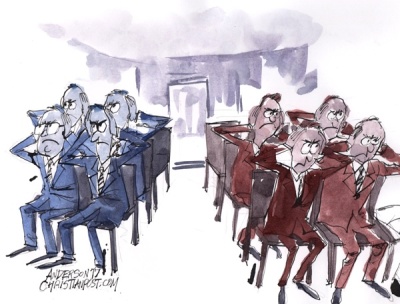The luxury of petty debates

The American West has become a nursery for the irrelevant, a sanctuary for distraction. Due to social media and a false elevation of ideals, Western Christianity has been bogged down by petty debates — a luxury not afforded to Christians globally. Christians in the U.S. must remember the supremacy of Christ in their engagement in current issues.
In his letter to the Corinthian church, the Apostle Paul “decided to know nothing among you but Christ and him crucified” (1 Cor. 2:2). As a Roman-born, Jewish-taught man, Paul knew much and had the right to maneuver otherwise restricted situations. In the temple, he could be referred to as Jewish, while in the company of Gentiles, he could be referred to as a friend. In every setting, however, he could be called a follower of Christ.
Paul’s main directive, seen in the New Testament epistles and biblical documentation about his life, was not to be distinctly Jewish or Greek-speaking, but to lose all things to the extent that he only has Christ, and may “share his sufferings, becoming like him in his death, that by any means possible [he] may attain the resurrection from the dead” (Phil. 3:9-10).
Suffering, according to Timothy Keller, is “the acid test of meaning.” Across all cultures and time periods and experiences, suffering is an affliction that has been (or will be) the determining factor of the priorities of a person, community, or nation.
The last few years have felt like a constant acid test.
A global pandemic, the war between Ukraine and Russia, political tensions in the U.S., mass shootings, and the uncovering of sexual assault mishandlings by Liberty University, John MacArthur’s Grace Community Church, the Southern Baptist Convention, and Ravi Zacharias International Ministries, have made every day seem daunting, every moment suffocating for the fervent Christian.
Yet, in this rise of massive controversy and dissension, a still more overwhelming amount of debate and strife has protruded into everyday life; whether via social media or human conversation, any breathable, suffering-less air is taken up by trivial, petty debates.
In a letter to his disciple, Paul instructs Timothy to “Guard the deposit entrusted to you. Avoid the irreverent babble and contradictions of what is falsely called ‘knowledge,’ for by professing it some have swerved from the faith” (1 Tim. 6:20-21). During the rise of Rome and the heavy influence of Greeks in the first century, knowledge was a diamond. It was sought after to the point that men would construct palaces with which to showcase their collections of knowledge — the most notable of these was the Library of Alexandria. While much changed anno Domini, one thing that didn’t was the rise in education and knowledge.
In Acts, Paul sees this intersect with the early Church at the Jerusalem Council. It may suffice to say that knowledge influenced Jewish decisions more than the heart and teachings of Christ. Pharisees were more concerned with what they knew about the Law’s teaching and how to practice it outwardly, than their ability to let the power of Christ indwell them.
Such might be the same for Christians in the U.S. today. Centuries of religious thought and a years-long struggle to engage cultural and political issues have led to the Christian incentive to be right, always. The United States has been afforded the luxury of engaging in petty debates.
By petty debates I mean those arguments that are important, only as far as the cultural or societal moment allows. These are not arguments distinctly related to biblical salvation (i.e., what does it take for someone to be saved; can someone lose their salvation?), but often culture-centered issues, such as the question of what political party to vote for.
In persecuted countries, Christians do not have the luxury to taint their minds with issues that would fall into the lower levels of Albert Mohler’s Theological Triage. The issues they encounter are life-threatening. They may not concern themselves with the justice system or deep eschatology so long as the Gospel goes forth.
A Christian perspective on politics and social issues is important — in fact, Christians should hopefully bring the most objective and reasonable thoughts to those conversations. But we must not abandon the centrality of the Gospel for the sake of second-rate issues. These things have caused long Twitter threads — people at each other’s digital throats — and strained friendships for those in the American Church.
In the mirk of petty debates and seemingly endless dialogue on everything, remember the words of Paul and the life of Jesus Christ. Jesus, seeing the sinful plight of man, descended into our darkness and, in our place, paid the punishment for our sins. He arose victorious over death and charged us to “go therefore and make disciples of all nations,” promising his accompanying presence until “the end of the age” (Matt. 28:19-20).
Concern yourself with the mission of Christ above all. When necessary, engage in lower-tier conversation — but always bear in mind the end goal: showing the love of Christ and his saving power. If anything, know nothing but Christ, and him crucified. That he is enough.
Justin Bower is a student at Liberty University pursuing a degree in American Sign Language Interpretation with a minor in Biblical Studies. When he's not writing op-ed articles for The Liberty Champion or other Christian news sources, he writes for his personal blog and record/produce a podcast called Beggar & Bread.



























